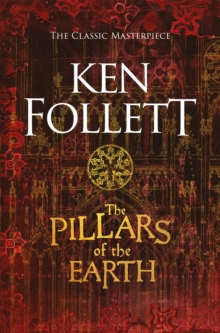The Pillars of the Earth by Ken Follett
The Pillars of the Earth is over 1,000 pages long and at times feels more like an installment in the Game of Thrones series than historical fiction. Set in the 1100s during The Anarchy, when civil war in England led to widespread violence, lawlessness and instability, it's epic in scale, spanning decades, and yet despite this things often seem to happen remarkably quickly - it's quite a rollercoaster ride.
There are numerous different plot strands, all of which are connected, one way or another, to the building of a cathedral. To build Kingsbridge Cathedral is the burning ambition of Tom, a master builder, for whom the project not only represents employment for the rest of his working life and financial security for his family, but also the pinnacle of his achievement: to build a beautiful cathedral is all he's ever wanted to do. Philip, the Benedictine prior of Kingsbridge, wants to run a thriving monastery with a prosperous estate and the new cathedral will bring in much-needed revenue - he's a religious man but he's also wily and pragmatic, and finds himself increasingly embroiled in the politics of both church and crown. Aliena, the daughter of a disgraced nobleman, wants her family's lands back from the unequivocally evil Hamleigh family who have been given her father's earldom and revenge for the wrongs done to her and her brother Richard. Into that mix you can throw scheming bishops, warring noblemen, vicious outlaws, unlikely alliances, arson, famine and of course, the building of the cathedral itself and all that it symbolises.
Follett has a clear, simple and unpretentious prose style and despite its intimidating page count The Pillars of the Earth really doesn't feel as long as it is. The fortunes of the Kingsbridge and its inhabitants can, and do, soar or plummet with smallest changes in luck or the whims of archbishops and barons, and there are plots, betrayals and battles galore. While Follett doesn't much go in for poetic description or subtle characterisation, he's excellent when it comes to throwing in historical detail in a way that makes the period setting feel vivid and real, cathedral-building and all, but also seems entirely natural and incidental. It's also a great example of a story which really brings home the impact of historical events on ordinary people - the ones we rarely hear about - and their lives. And while the characters are sometimes fairly black and white, that doesn't mean they don't feel real, and I felt fully invested in their lives from start to finish.
There are some things wrong with this book - that simple prose is a bit clunky at times; there are scenes of rape which feel exploitative and would be far better happening 'off camera'; there are times when things are spelled out that we've already realised; there are a few laughably ridiculous references to a particular character's breasts which certainly remind you that this book was written 30 years ago and by a man.
However, this is one of those books where I could see the faults but simply didn't care because I loved coming along for the ride. I loved the story, I loved the atmosphere, I loved the characters - Prior Philip in particular - and I was utterly immersed in their world from page one. Now I just need to decide whether to get stuck into the sequels or save them for my summer holiday.
Brick-sized paperback here and here. Kindle download here.
Follett has a clear, simple and unpretentious prose style and despite its intimidating page count The Pillars of the Earth really doesn't feel as long as it is. The fortunes of the Kingsbridge and its inhabitants can, and do, soar or plummet with smallest changes in luck or the whims of archbishops and barons, and there are plots, betrayals and battles galore. While Follett doesn't much go in for poetic description or subtle characterisation, he's excellent when it comes to throwing in historical detail in a way that makes the period setting feel vivid and real, cathedral-building and all, but also seems entirely natural and incidental. It's also a great example of a story which really brings home the impact of historical events on ordinary people - the ones we rarely hear about - and their lives. And while the characters are sometimes fairly black and white, that doesn't mean they don't feel real, and I felt fully invested in their lives from start to finish.
There are some things wrong with this book - that simple prose is a bit clunky at times; there are scenes of rape which feel exploitative and would be far better happening 'off camera'; there are times when things are spelled out that we've already realised; there are a few laughably ridiculous references to a particular character's breasts which certainly remind you that this book was written 30 years ago and by a man.
However, this is one of those books where I could see the faults but simply didn't care because I loved coming along for the ride. I loved the story, I loved the atmosphere, I loved the characters - Prior Philip in particular - and I was utterly immersed in their world from page one. Now I just need to decide whether to get stuck into the sequels or save them for my summer holiday.
Brick-sized paperback here and here. Kindle download here.

Comments
Post a Comment